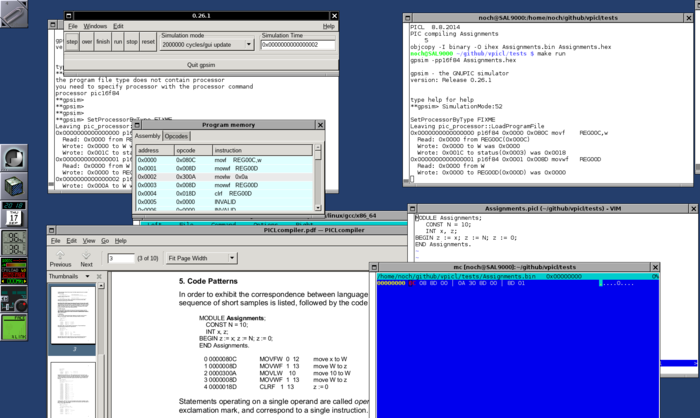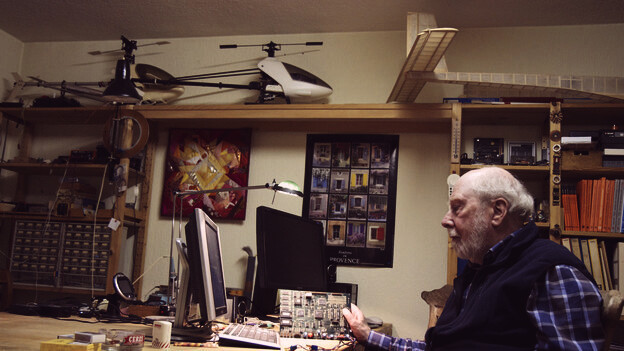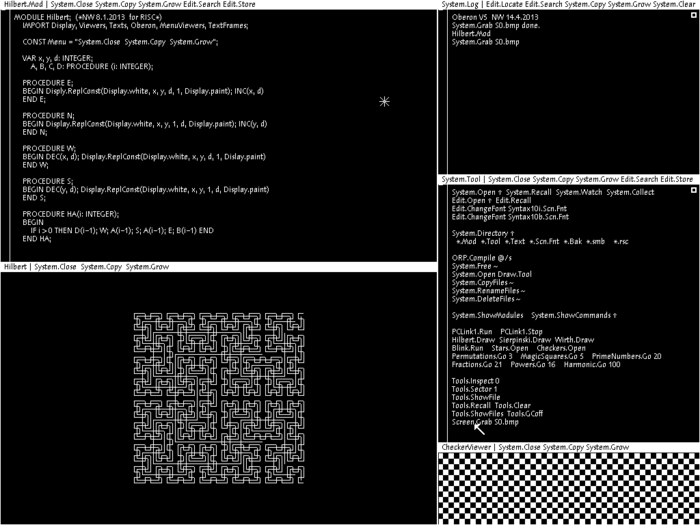this is a very good blog post՝ back to basics about strings in C and Pascal. i suggest you to read it, and now i’ll tell you something else:
in Oberon, Wirth decided to give up on Pascal strings, and use zero terminated strings.
however, there is no need to run by the whole array to find out the length of the string. we don’t even need to have a separate field that holds the length՝ compiler knows the length of the static string.
thus it can do compile time tests. for example we have the following Oberon source՝
MODULE tst;
IMPORT Out;
VAR i: SHORTINT;
str: ARRAY 1024 OF CHAR;
BEGIN
FOR i := 0 TO LEN(str) DO
Out.Int(i, 0); Out.Ln
END;
END tst.
lets try to compile it՝
[2020-09-02 16:00:20] $ voc -m tst.Mod
tst.Mod Compiling tst.
9: FOR i := 0 TO LEN(str) DO
^
pos 102 err 113 incompatible assignment
Module compilation failed.
[2020-09-02 16:00:21] $
voc compiles Oberon source to C, which is very good to illustrate what happens. if we have՝
str: ARRAY 16 OF CHAR;
then the output C code will be՝
static CHAR tst_str[16];
nothing more։ no field for the length.
still, this՝
FOR i := 0 TO LEN(str) DO
will translate to՝
tst_i = 0;
while (tst_i <= 16) {
as i said we know the length at compile time. doesn’t matter if you generate C or assembly, you already know the number, you can put the number to the output assembly code as well.
when we write a function which receives strings, we should not knowt the length of the received string, we just use ARRAY OF CHAR as an argument՝
MODULE tst2;
PROCEDURE addStrs(VAR a, b: ARRAY OF CHAR);
BEGIN
(* do smth useful here *)
END addStrs;
PROCEDURE test*;
VAR
s0: ARRAY 32 OF CHAR;
s1: ARRAY 64 OF CHAR;
BEGIN
addStrs(s0, s1);
END test;
END tst2.
therefore C code will be՝
static void tst2_addStrs (CHAR *a, ADDRESS a__len, CHAR *b, ADDRESS b__len)
{
/* here we think we can do smth useful */
}
void tst2_test (void)
{
CHAR s0[32];
CHAR s1[64];
tst2_addStrs((void*)s0, 32, (void*)s1, 64);
}
as we see՝ the function also gets the length of strings. and if we do LEN(a) we get the length without any calculations.
now let’s see how dynamic strings work՝
MODULE tst3;
PROCEDURE addStrs(VAR a, b: ARRAY OF CHAR);
BEGIN
(* do smth useful here *)
END addStrs;
PROCEDURE test*(i: INTEGER);
VAR
s: ARRAY 32 OF CHAR;
ps: POINTER TO ARRAY OF CHAR;
BEGIN
NEW(ps, i);
addStrs(s, ps^);
END test;
END tst3.
now we hase a static string՝ s and we allocate a dynamic string with its pointer ps.
lets assume we don’t know the size of ps^ string (^ means dereference) and we will receive the length of the allocated string as a function argument. it is not known at compile time.
first function remains unchanged, second function gets translated like this՝
static void tst3_addStrs (CHAR *a, ADDRESS a__len, CHAR *b, ADDRESS b__len)
{
/* do smth useful here */
}
void tst3_test (INT16 i)
{
CHAR s[32];
struct {
ADDRESS len[1];
CHAR data[1];
} *ps = NIL;
ps = __NEWARR(NIL, 1, 1, 1, 1, ((ADDRESS)(i)));
tst3_addStrs((void*)s, 32, (void*)ps->data, ps->len[0]);
}
the _NEWARR is a bit more complicated function, which is a part of the runtime.
but we can understand what it does՝ it allocates a space in the heap, and the pointer ps we get now points to the struct, which has a data field and len field.
this is a runtime information, and in this case we have to keep a separate field for the length of the string.
that’s it.
#oberon #c #pascal #wirth #programming #programming-languages #programming_languages #design #implementation #vishap #voc #compiler #compilation #strings #string #heap #stack #storage #storage-management #storage_management #length
Why I use Object Pascal https://dubst3pp4.github.io/post/2017-10-03-why-i-use-object-pascal/
#pascal #programming #article #object_pascal #design
first of all, the article does not mention the most important thing - modules. pascal has modules. modules were introduced to c++ just in 2017. modules are why you can have type checks across boundaries of modules.
and pascal units are modules. if they do those loadable on demand, that would be cooler.
Pascal is very strict, so the programmer has to differ between subroutines that return values, in Pascal called functions, and subroutines that does not return something, called procedures. Functions and procedures can also be passed to variables or other functions thanks to procedural types.
well, in pascal successors the function keyword removed, leaving just one procedure, or to be precise PROCEDURE because Wirth decided to make successor languages case sensitive and decrease the number of lexems.
It is possible to overload operators for specific types. With this feature, you have the power to define, let’s say, the result of the addition operation of two or more instances of the same class.
That’s one of the reasons why Wirth doesn’t like modern pascal implementations. The author tries to say - Pascal has all the features, while Wirth was trying to create a minimalistic language by following “less is more” principle.
Pascal is modular
okay, he said this. but did not connect to the type checks.
Pascal has good documentation
indeed, freepascal.org documentation is good, understandable and comprehensive.
well, for me Pascal today is like ‘better c++’, but why would i need better c++ if i have Oberon?
i will use it to write gui applications, or if i need to write something very fast and i don’t have libraries for Oboren and time to create libraries or bindings.
#pascal #oberon #modula-2 #wirth #design
Me being a teacher had a decisive influence on making language and systems as simple as possible so that in my teaching, I could concentrate on the essential issues of programming rather than on details of language and notation.
#wirth #pascal #modula #oberon

I have managed to port Wirth’s PICL language compiler (which generates code for PIC16F84) to GNU/Linux(used voc to compile it), I mean, it’s possible to run it, compile sample programs with it on my desktop. Now need to make some more improvements and write a manual so that people can use it.
#pic #pic16f84 #embedded #embedded_programming #programming #screenshot #compiler #wirth #picl #programming_languages #hardware #hardware_programming #oberon
the belief is wide-spread that programming is easy, can be learned on the job, and does not require specific training or talent. However, it is not programming in the sense of coding that is the problem, but design. Applications have become very demanding and their tasks complex. Mastering this growing complexity is the primary challenge. To tackle this task requires experience and an explicit ability for abstraction on many levels. It is difficult to learn this, and even more so to teach it. Not every programmer is a born designer.
https://www.simple-talk.com/opinion/geek-of-the-week/niklaus-wirth-geek-of-the-week/
#programming #wirth #design
wow, here Dijkstra writes how he lived at Wirth’s house near Zurich and how he was amazed with he’s works.
#wirth #dijkstra #zurich #modula-2 #modula2 #medos #programming

In seiner Jugend baute Niklaus Wirth Modell-Flugzeug und hat dabei gelernt, sich auf das Wesentliche zu beschränken
http://www.srf.ch/wissen/digital/computer-pionier-niklaus-wirth-80-und-aktiv
#oberon #wirth #foto
Niklaus Wirth steuert Ceres-PC mit Oberon @ETH, 27. Mai 2011
https://www.youtube.com/watch?v=HoZuzE7Lq5E
#niklaus-wirth #wirth #ceres #oberon #eth #2011 #operating-systems #video #programming
Wirth updated he’s Project Oberon sources in February 4, so I decided to track the changes by putting those sources to github. These are changes, mainly in Kernel.Mod https://github.com/norayr/ProjectOberon/commit/86576bbc7b0f8d5153d5b12e4093d1d6310ad72e
#oberon #wirth #kernel #programming #github #git #book #project-oberon #development #software

New edition of Wirth’s book Project Oberon is out. It describes not only built from scratch software(entire operating system and compiler), but design of the hardware as well.
The vast complexity of popular operating systems makes them not only obscure, but also provides opportunities for “back doors”. They allow external agents to introduce spies and devils unnoticed by the user, making the system attackable and corruptible. The only safe remedy is to build a safe system anew from scratch.
http://www.inf.ethz.ch/personal/wirth/ProjectOberon/index.html
#oberon #wirth #niklaus-wirth #risc #programming #fpga #books #programming-languages #compilers #operating-systems #compiler #freedom #design #security #privacy #surveillance #reliability